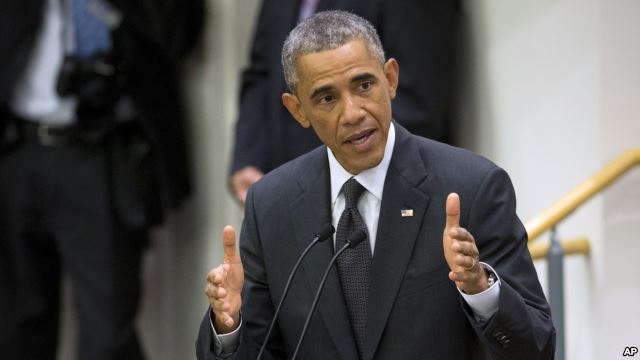 President Barack Obama addresses special meeting on the Ebola outbreak, United Nations, New York, Sept. 25, 2014. (AP Photo)
President Barack Obama addresses special meeting on the Ebola outbreak, United Nations, New York, Sept. 25, 2014. (AP Photo)
September 25, 2014
Continuing White House efforts to combat the outbreak of Ebola in Africa, U.S. President Barack Obama warned a summit of world leaders in New York on Thursday that the disease is becoming “a growing threat to regional and global security.”
Addressing the special United Nations meeting on the outbreak, Obama called efforts to stop the virus from spreading “in the interests of the entire world.”
“In Liberia, Guinea and Sierra Leone, public health systems are near collapse. Economic growth is slowing dramatically,” he said. “If this epidemic is not stopped, this disease could cause a humanitarian catastrophe across the region.”
Citing recent U.N. commitments to fight the virus, Obama acknowledged some progress but said “it’s not enough.”
“There’s a significant gap between where we are and where we need to be,” he said, calling on international organizations, member states, foundations and businesses to mobilize resources and offer support.
“And more citizens — of all nations — can educate themselves on this crisis, contribute to relief efforts and call on their leaders to act,” he said. “Everyone can do something.”
He then called on UN member states to heed calls from the “front lines” for increased medical supplies and aid.
“Right now, patients are being left to die in the streets because there’s nowhere to put them and no one to help them,” he said. “One health worker in Sierra Leone compared fighting this outbreak to ‘fighting a forest fire with spray bottles.’ With our help, they can put out the blaze.”
His comments come on the heels of a new U.S. Centers for Disease Control and Prevention (CDC) report Tuesday that between 550,000 and 1.4 million people in West Africa could be infected with the Ebola virus by January 20, 2015.
Based on the assumption that the actual number of Ebola cases has been underreported, the CDC said in a statement that “extensive, immediate actions — such as those already started — can bring the epidemic to a tipping point to start a rapid decline in cases.”
The agency’s best-case model projects that by getting 70 percent of patients into facilities where the risk for transmission is reduced and burying the dead safely, the epidemic would be “almost ended” by January 20.
“Stopping Ebola is a priority for the United States,” Obama said. “We will continue to lead and do our part. But this must also be a priority for the world.”
The president then announced a Friday meeting of 44 nations in Washington aimed at advancing global health security. “And we will work with any country that shares that commitment,” he said.
$1B plan
The president announced last week a $1 billion-plus U.S. plan to help West African nations contain Ebola. “We need a broader effort to stop a disease that could kill hundreds of thousands, inflict horrific suffering, destabilize economies, and move rapidly across borders,” Obama said during his speech to the U.N. General Assembly Wednesday.
“It’s easy to see this as a distant problem — until it is not. And that is why we will continue to mobilize other countries to join us in making concrete commitments, significant commitments to fight this outbreak, and enhance our system of global health security for the long term,” the president added.
The U.S. has deployed doctors, scientists and military personnel to help “contain the outbreak and pursue new treatments,” Obama said.
According to the World Health Organization, the exponential spread of the Ebola has now killed almost 3,000 people in West Africa.
Sierra Leone’s President Ernest Bai Koroma and Liberian President Ellen Johnson-Sirleaf will also take part through teleconference.
According to news reports by The Associated Press, Sierra Leone on Thursday sealed off an area that is home to more than 1 million people as part of efforts to keep the virus from spreading.
“The newly declared quarantine areas mean that about one-third of the country’s 6 million people are now living in areas where their movements are heavily restricted,” the report said.
Also Thursday, Secretary of State John Kerry announced the appointment of Ambassador Nancy Powell to lead the Ebola Coordination Unit at the Department of State.
According to statement by State Department spokesperson Jen Psaki, Powell, who most recently served as U.S. Ambassador to India, “served as the State Department’s Senior Coordinator for Avian Influenza.”
“Ambassador Powell will lead the State Department’s outreach to international partners, including foreign governments, to ensure a speedy and truly global response to this crisis,” Psaki said.
U.N. Secretary-General Ban Ki-moon is hosting Thursday’s gathering of world leaders aimed at rallying efforts to contain the outbreak, prevent future ones and treat those who are infected.
Some information for this report comes from AP.
—
Related:
Ethiopian American Doctors Release Communiqué on Ebola Outbreak
Join the conversation on Twitter and Facebook.

























